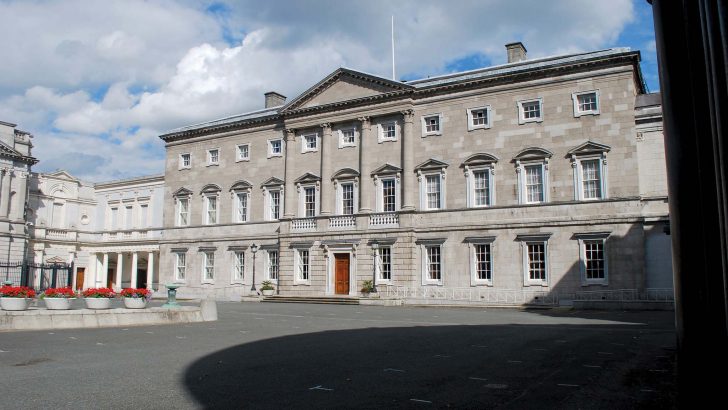For Catholics, true human freedom is possible only inasmuch as reason and will participate or share in God’s wisdom and providence writes Fr Kevin O’Reilly OP
In recent times in Ireland and elsewhere, the legal protection for the unborn has been removed. Same-sex marriage has received constitutional recognition, and now there are moves to legalise euthanasia.
How are Catholics – and particularly politicians who profess to be Catholic – to approach these issues in the public square? Vatican II’s Pastoral Constitution on the Church in the Modern World, Gaudium et Spes, speaks of a “rightful autonomy of earthly affairs” (GS 36). Does that assertion mean that Catholics are free to divorce faith-informed reason from their political choices and actions?
Gaudium et Spes itself provides a clear and emphatic answer: the Church supports efforts to foster human rights so long as these efforts “be penetrated by the spirit of the Gospel and protected against any kind of false autonomy” (GS 41).
With this reference to false autonomy Gaudium et Spes distances itself from modern and contemporary (mis)understandings of what constitutes true human freedom. It mentions specifically the erroneous idea that our rights are ensured only when we free ourselves from the demands of the divine law.
Human dignity
What is more, Gaudium et Spes asserts that human dignity is destroyed when it is understood in the light of a false conception of autonomy. John Paul II’s encyclical, Veritatis Splendor, flows in the stream of tradition that comes after the Second Vatican Council. There he critiques this false conception of freedom, which asserts that human beings are free to create their own values.
Human freedom, in this erroneous view, lords it over truth. Its bottom line is that individuals or social groups have the right to decide what is good or evil. Even truth itself is considered to be a creation of freedom.
According to the Catholic Magisterium, as expressed in Veritatis Splendor, true human freedom is possible only inasmuch as reason and will participate or share in God’s wisdom and providence. This assertion is in keeping with the teaching of Thomas Aquinas concerning the natural law.
Natural law
Aquinas explains that the natural law is derived from or participates in the eternal law. The eternal law is essentially God’s providential rule of the universe.
The eternal law and the natural law are two sides of the same coin insofar as human beings are concerned. According to Aquinas, the natural law “is nothing else than the rational creature’s participation in the eternal law.” Aquinas argues that God moves rational creatures in accord with their freedom.
Aquinas is very clear: all laws, inasmuch as they are the fruit of right reason – which excludes any law that results from human sinfulness – are derived from the eternal law, that is to say, from God himself.
Human or positive law is no exception. Inasmuch as it disregards the natural law – and thus the eternal law – legislation no longer properly speaking bears the character of law but is rather a perversion of law.
Aquinas likens law-making to art. Much more pertinent to the present discussion however is his idea that something can be derived from the natural law as a conclusion from premises.
The example he gives is that “one must not kill.” This conclusion is drawn from the principle that “one should do harm to no human being.”
For Aquinas, the most sublime expression of the eternal law occurs in the incarnation of the Word. The ordering force of God’s wisdom and providence have been ultimately revealed in Jesus Christ.
Following St Paul, Aquinas intimates that this wisdom bears the sign of the Cross. It involves suffering. John Paul II proclaims the classic Christian conviction that contemplation of Jesus Crucified, the supreme manifestation of God’s wisdom and providential ordering of human affairs, is the highroad to be trodden in the quest for moral maturity.
In the case of a Catholic politician, this suffering will no doubt be entailed by adhering to the tenets of Catholic morality, which tenets are an expression of the faith.
Positive law
The guidelines that the natural law sets for positive law are of course very general. This article cannot discuss the complexities involved.
This much, however, is clear: one cannot in good conscience directly intend an intrinsically evil act in the political sphere for any end, even if this act were to contribute significantly to the common good. We are in the ambit of conclusions drawn from principles.
In this regard it is imperative to note that to support a serious evil in the political sphere can be taken to intend this evil – notwithstanding the highly confused, albeit sincere, reasoning involved.
The only morally legitimate approach open to a Catholic operating in the public square is openly to oppose attacks on the basic goods of human life and family as founded on heterosexual marriage.
The only morally legitimate way for citizens to cast their votes is to do so in favour of candidates who promote these basic human goods.
Fr Kevin O’Reilly OP is a lecturer in moral theology as the Pontifical University of St Thomas Aquinas in Rome


 Leinster House
Leinster House 